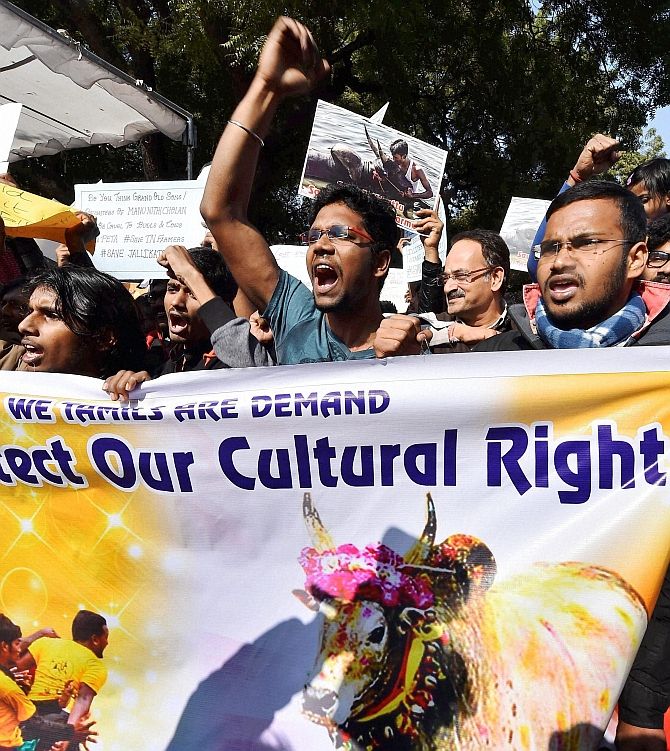As protests demanding Jallikattu swelled on the streets of Tamil Nadu, Attorney General Mukul Rohatgi on Thursday said the state government has the power to enact a law to treat Jallikattu as a traditional sport, but cautioned that the animals should not be harmed or cruelly treated during such events.

Rohatgi, who defended in the Supreme Court the Centre's stand allowing use of bulls in events like Jallikattu, said that as far as sports is concerned, it is within the exclusive jurisdiction of respective state governments and the Centre has no power on it.
"That is not a power with the Centre at all because the Constitution demarcates the role of the Centre and states... As far as sports are concerned, it is in the exclusive jurisdiction of the state," he said.
"Now the state could consider making it a law treating it as a traditionl sport, but the state must keep in mind while framing such a law that there is no cruelty attached to the sport. It should not just be for sport without bothering about the plight of the animals. I mean, you have bull fights in Spain. Those are cases where bulls are killed," the top law officer said while talking to news channel Times Now.
On January 8 last year, the Centre had issued a notification lifting the ban on Jallikattu in Tamil Nadu with certain restrictions.
The notification was challenged in the Apex court by the Animal Welfare Board of India, People for Ethical Treatment of Animals India, a Bangalore-based NGO and others.
The court has reserved its verdict on a batch of petitions challenging the notification allowing the sport.
Tamil Nadu Chief Minister O Panneerselvam, who on Thursday met Prime Minister Narendra Modi over the issue, said that state government will soon take steps to enable holding of Jallikattu with support from the Centre.
Speaking on the issue which has created a stir in Tamil Nadu, Rohatgi said people in the state rever the bull and it cannot be said that they treat them with cruelty and the law can allow the sport subject to certain stringent conditions.
"So the law can allow the sport subject to stringent conditions that there will not be anybody in a distance of 100 feet, nobody can throw stones or do any acts of cruelty and if the same are found to be done, then there can be punishment, so that the concerns of the Supreme Court rendered in the judgement, the concerns about cruelty, are also kept in view and a balanced position can be found by the state concerned. That I think is the correct legal position," he said.
The Apex court had earlier questioned the Centre for its January 2016 notification allowing the use of bulls in events like Jallikattu, saying that its 2014 verdict banning the use of the animals cannot be "negated".
Regarding the Prevention of Cruelty to Animals Act, the Attorney General said it is a central law which can be amended by Parliament but if it is a sport in a local area, "let the state make the law relating to the sport minus any cruelty, with stringent punishment" for those who commit cruelty.
He said there is no legal or constitutional bar for the state not to act as soon as it wants to and they can call a special session or issue an ordinance.
The right to bring a law or issue an ordinance is the same right in Parliament for the entire country and the same right in the state assembly for the state, he said.
"Merely because somebody may have (done) some cruelty, does not mean that the sport must itself be abolished," he said.
While discussing about the possibility of similar protests against court orders in future, Rohatgi said "these issues sometimes raise emotional aspirations, but we have to think calmly, the law of the land must prevail. You can't have a situation where the judgement of the court is hijacked by personal emotions of a group."










